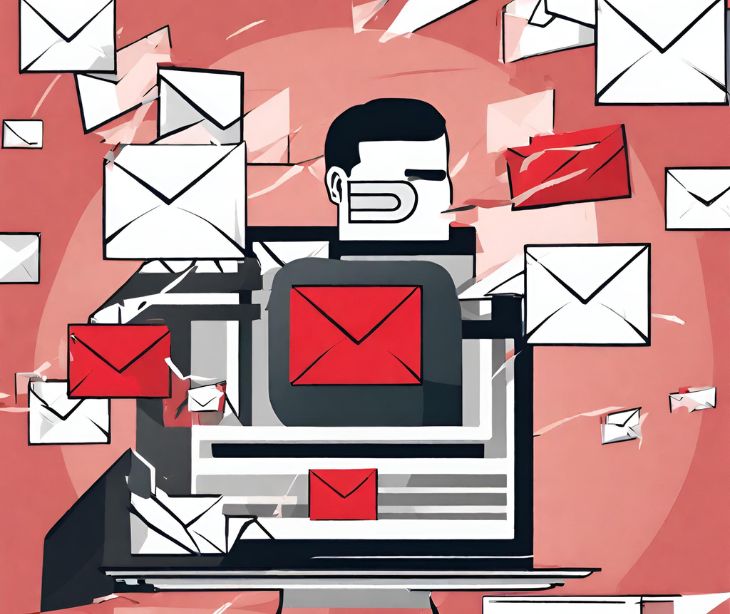3 min read
Understanding BIMI (Brand Indicators for Message Identification)
Kirsten Peremore
February 20, 2024

Brand Indicators for Message Identification (BIMI) is email specification that allows companies to display their logos next to their authenticated email messages within their recipients' inboxes. This is designed to bolster email authenticity and enhance the visibility of the brand's presence directly in the user's email interface. BIMI integrates with established email authentication protocols, including DMARC, SPF, and DKIM.
It also establishes a visual indicator of trust, enabling recipients to easily and quickly recognize emails from legitimate sources. To leverage BIMI, a brand must first ensure they have implemented DMARC policies correctly and then publish a specific BIMI record within their DNS settings, pointing to their logo's URL.
See also: What is DMARC?
How does BIMI work?
- Brands create a BIMI record that includes a URL to their logo and publish it in their DNS.
- They ensure their emails are authenticated using DMARC, SPF, and DKIM standards.
- Email providers check the sender's DMARC policy for compliance when receiving an email.
- If the email passes authentication checks, the email provider retrieves the brand's logo using the URL in the BIMI record.
- The email provider then displays the logo next to the sender's name in the recipient's inbox, making the email stand out and signaling its authenticity.
Verified Mark Certificate (VMC) and BIMI
The Verified Mark Certificate (VMC) is a component in the BIMI ecosystem, acting as a digital certificate that authenticates the legitimacy of a brand's logo used in email communications. This relationship between VMC and BIMI is foundational to enhancing email security and brand recognition in a novel way. When a brand adopts BIMI, which allows its logo to appear next to its authenticated emails in users' inboxes, having a VMC becomes necessary, especially for brands seeking to maximize trust among their email recipients.
The VMC serves as verifiable proof that the brand has the legal right to use and display the logo, having undergone a rigorous verification process by an authorized third-party. This verification ensures that the logo represents the brand accurately and is not subject to impersonation or fraud. Email providers, such as Gmail, may require the presence of a VMC for a brand's logo to be displayed through BIMI, reinforcing the security framework of email communication by assuring recipients that the emails they receive are from a verified and trustworthy source. This symbiotic relationship between VMC and BIMI also contributes to the reduction of phishing and spoofing attacks.
See also: Top 10 HIPAA compliant email services
How does the use of BIMI benefit healthcare marketing campaigns
Enhanced brand visibility and recognition
BIMI ensures immediate brand recognition by displaying the healthcare brand's logo directly in the inbox. This visual cue helps the brand stand out in a crowded inbox, making emails more likely to be opened and read. For healthcare organizations, increased visibility can directly translate into higher engagement rates.
Improved trust and credibility
Trust is a necessary component in healthcare communications. Patients and clients need to feel confident that the information they're receiving is from a reliable source. BIMI enhances trust by visually verifying the sender's identity through the brand's logo. This reassurance is needed in an era where phishing and fraudulent emails are common, helping recipients differentiate between genuine healthcare communications and potential scams.
Enhanced patient engagement
Effective engagement with patients and clients is key to successful healthcare outcomes. BIMI can contribute to this by making email communications more attractive and recognizable. When recipients see a familiar and trusted logo next to an email, they are more likely to engage with the content, whether it's educational information, appointment reminders, or health newsletters.
Differentiation in a competitive market
The healthcare sector is highly competitive, and organizations continually look for ways to differentiate their services. By adopting BIMI, healthcare providers can signal their commitment to security and patient engagement, offering a subtle but powerful competitive edge. It positions the brand as modern, secure, and patient-focused.
Potential for increased ROI on email marketing
Email marketing remains a cost-effective tool for healthcare organizations to communicate with their audience. BIMI can enhance the return on investment (ROI) of these campaigns by improving open rates and engagement. A recognizable logo can lead to higher trust and lower deletion rates, making each email more effective.
See also: HIPAA Compliant Email: The Definitive Guide
FAQs
What is the BIMI code?
The BIMI code refers to a DNS TXT record that organizations publish, containing a link to their logo for display in supported email clients once their emails pass DMARC authentication.
Does BIMI help with spam?
Yes, BIMI helps with spam by encouraging the adoption of stronger email authentication practices, thereby making it harder for spammers to impersonate trusted brands.
What is DMARC validation?
DMARC validation is a process that uses the Domain-based Message Authentication, Reporting, and Conformance protocol to verify the authenticity of an email's sender, helping to protect against phishing and spoofing.
What is DKIM and SPF?
DKIM (DomainKeys Identified Mail) and SPF (Sender Policy Framework) are email authentication methods that help verify the sender's domain and prevent email spoofing, with DKIM providing a digital signature to validate the email's integrity and SPF specifying which IP addresses are authorized to send emails from a domain.
Subscribe to Paubox Weekly
Every Friday we bring you the most important news from Paubox. Our aim is to make you smarter, faster.




